Posts published by “centaur”

So, in case you don't own this cat, the little brow-furrowed face Loki is currently making is his "I really want your food but you're not letting me eat it, so I'm going to sit just at arms length and fume" face. He thinks if he waits long enough, he'll be able to sneak in and try some. My long arm thinks otherwise.
Anyhoo, while I said I wanted to put blogging at the first of the day to make sure it got done, it turns out that I was way more interested in making sure that I didn't fall grievously behind on my Camp Nano project, Dakota Frost #7, SPIRAL NEEDLE, nor miss any of my other responsibilities.
I'm mostly caught up now, so I'm trying to put blogging back on the queue. Interestingly enough, after my rant about blocks, the WordPress folks have reached out to talk to me about blocks. Talk about customer service! So I'm also blogging trying to replicate the bugs I observed the other day that set me off.
So far, I cannot replicate the cut-and-paste error, where trying to select all the text only copied part of it - it is entirely possible that the system had just gotten into a cruftly state, which can happen to any program of sufficient complexity.
I can, however, replicate the cut-and-paste problem I had, where trying to re-order sentences introduced new paragraph breaks in a way that's not standard for Word, Google Docs, or TextEdit. This is probably most directly attributable to the text being in blocks, but it might be fixable.
I also reproduced the "Where's Waldo" interface issue where I could not easily inject new blocks - though now I see that can be fixed with a carriage return followed by a slash, which is documented in the interface, it is also possible that at the time something was just wrong with my editor.
I also debugged the problem I had with the interface. In TextEdit, Word and Google Docs, the first line of your document is the first line of your document. In WordPress, it is invisibly a title, as opposed to the Classic Editor which distinguishes this with a different text entry box. This is also probably fixable.
But there are other strange errors. Like, the sidebar that let you change the properties of the post are normally present when I blog, but had disappeared when I started this post. Weirdly, not even the button to show them was present - I had to toggle several other buttons and then it appeared, just where I remembered it. Not sure what's going on there. Since I restarted my computer recently and re-logged into WordPress, perhaps this is a "sticky" setting that went away when I cycled my browser. Still investigating.
-the Centaur
Pictured: Loki, trying to help me study generative AI.

This is your daily reminder that the Gutenberg editor of WordPress is a dumpster fire. I don't know that the people who made it are literally incompetent as far as technical coding goes: the bones of the program seem to be a well-functioning machine that rarely breaks down.
But Gutenberg is incompetent as a text editor, and whoever designed it was literally incompetent in terms of the "blocks" based design that they chose to push on all of us, because the "blocks" editor literally does not work as a text editor: basic things like selecting text, cutting it, and pasting in into a new place don't work, because the "blocks" break up your text selections and prevent you from maneuvering in the document.
Microsoft Word doesn't have this problem. Google Docs doesn't have this problem. Overleaf doesn't have this problem. Dropbox Paper does, a little, and it shares the incorrect (and I will fight you on that) "Where's Waldo" style interface which hides the text editor controls when you're not hovering over them, making them undiscoverable - perhaps Dropbox was also infected by "user experience."
But most damningly, the Classic Wordpress editor didn't have this problem. They had something that wasn't broke, and they didn't fix it with the incompetent thing they replaced it with, but they were so committed to forcing everyone to use their new thing, they broke the old one. (This is your daily reminder that using Classic Editor in modern WordPress destroys the formatting of the posts).
And I want to point out: the person who did this, Matt Mullenweg, did this to us on purpose:
We Called it Gutenberg for a Reason
It moves the WordPress ecosystem forward, but it also moves the whole web forward. Which is scary! Because change always is, and this is a big one. But a scary thing is usually a thing that leads to growth, if you can push through it. ... apathy would worry me a lot more than disagreement or controversy. Creating great software will never make every person happy.
So, in case you have trouble parsing this ... Matt and his team wanted to push a technical change which benefited their "ecosystem" - likely, just some internals of their system that they wanted to clean up, which would make it easier to implement features no-one wanted - and they started with a mindset that interpreted their failures as user unhappiness and software problems as complaints, which people needed to just power through so they could get to their new world order.
Matt, you took something that worked and broke it, and replaced it with something which will literally never work. Text editing is not block editing, and it's never going to be. It's a serial string of tokens that encodes a proxy of speech, and if you try to impose blocks on it, your editor will fail, as yours failed me today.
I was working on a post. One not much more complicated than this one. But simply cutting and pasting text was something that the Gutenberg editor failed miserably at, and I was not able to successful edit my text. Even copying it out to Word took several tries, because not only did Gutenberg make it hard to select all the blocks, it did not even copy the text out of all the blocks, so I had to do it piecemeal.
I don't actually want to give up on Gutenberg becoming better. But I strongly feel the only way to successfully fix the interface it is to thow away the key metaphor behind it - the block. That's fine as a backbone behind the text which WordPress uses for rendering - but a text editor should manipulate text.
-the Centaur
Pictured: some nice flowers which the previous owners planted near a corner.
[eighty-eight] minus one-oh-six: in my quest for the perfect tomato sandwich, i have inadvertently recreated the BLT

OK, full disclosure: this is more like "the perfect sandwich using tomatoes, if you know you're going to be eating out for a few days and want to empty out your refrigerator so don't buy anything too fancy" than the actual perfect tomato sandwich. I go through phases where I eat in most of the time and where I eat out most of the time, and near the end I try to make sure that I use up everything that I have.

Tomato sandwiches are perfect for this: I almost always have bread or or buns or croissants at the house, but will often be left with a few extra tomatoes and some lettuce if I have previously made tabbouleh. But, by themselves, tomato sandwiches can be a little boring. So I started looking up recipes, and found one which involved sautéing a bunch of herbs as a garnish - but which I can simulate pretty effectively with a bit of veganaise, dill, salt, pepper, and onion powder.

Leftover tomato can be turned into a mini-salad (upper right, above) with a little salt and pepper and any remaining veggies or lettuce you have. Personally, I like toasting the thick "Nature's Own Perfectly Crafted Multigrain" bread better than the hamburger buns you see above, as you can spread the lettuce and tomatoes out to create a wider sandwich that's easy to eat. It also seems to go better with a nice peaty Scotch like Ardbeg than it does with a margarita, but on all of that, your mileage may vary.

Regardless, I was again cleaning out the freezer of frozen stuff, mostly breakfast items, and found some vegan bacon, which I thought, "hey, that will add savory, I am a genius"! Only when I was done with it did I realize I had simply re-invented the good old bacon-lettuce-tomato sandwich that my finicky tastebuds had steered me away from as a youth. Well, they're not steering me away from it now.
Oh, the recipe. Makes two sandwiches:
- 4 slices Nature's Own Perfectly Crafted Thick-Sliced Multigrain, or bread of your choice
- 1 beefsteak tomato, or tomato of your choice
- 4 leaves of Bibb or Butter lettuce, or lettuce of your choice
- Veganaise, or spread of your choice
- Salt
- Pepper
- Dill Weed
- Onion Powder
- Optionally, 4 slices of vegan bacon, or, just bacon
Wash and clean the lettuce leaves. Slice the tomato to create four thick slices from the middle. Chop up the ends, salt and pepper them, and add to a small bowl as a mini salad with any other veggies you have, such as leftover lettuce. Toast the bottom slices of bread and spread on the veganaise, then season the veganaise with salt, pepper, dill weed and onion powder. Layer on the tomatoes, two slices per bread, and salt and pepper them as well. Then add the lettuce. (Note: if using wide bread, line the tomato slices up, then add the lettuce, but if using hamburger buns, you can stack tomato-lettuce-tomato-lettuce). Optionally add tomatoes and close off the sandwich. Serve with your beverage of choice.

-the Centaur
Pictured: a lot of tomato sandwiches.

Last week, frankly speaking, I was feeling kind of low. I had launched a major paper to arXiv (an event which I tweeted et al, but somehow haven't blogged yet) and had a big opportunity to get caught up on stuff. But I couldn't seem to get rolling, not even on my Camp Nano project, Dakota Frost #7, SPIRAL NEEDLE.
I met with my buddy Jim Davies and came up with the idea of restructuring my day, which worked well and I blogged about last week. But when Monday rolled around, and a lot of stuff wasn't done, I decided that I needed to throw away that script and make sure that the important "hanging tasks" got done.
And I did. Maybe not a third of the ones I wanted to get done, but I chewed through a lot of them. And I realized that, after spending a year and a quarter on that big arXiv paper and the Embodied AI Workshop, that I probably needed more recharge time than I had given myself.
But I had felt I didn't have time, as I had to roll into Camp Nano on July 1st and there were other tasks, like managing the repair of our air conditioning system and disbursing awards to the winners of Embodied AI Workshop challenges, that also couldn't wait. Things often just start when they are scheduled to start.
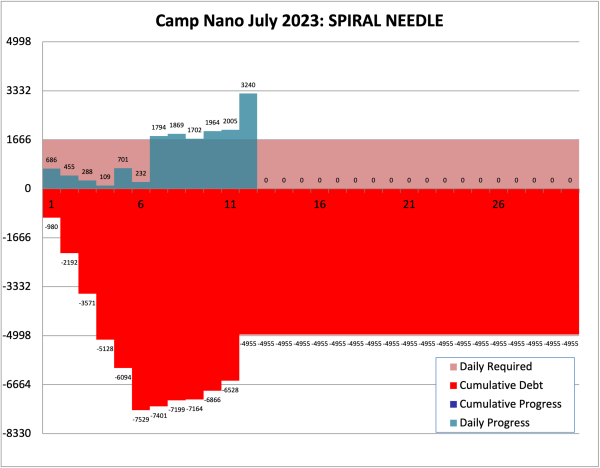
But whether I had that time to take off, I needed that time, as you can maybe see above. The first week of Camp Nano, I was running below full power. After a week's worth of the motor sputtering on 50%, giving me a forced recharge, you can see my writing rate start to climb up again, as it should be.
But the lesson isn't just that it's important to be kind to yourself - the modern phrase is "self-care" - because, as I said, things often start when they wanna start. And this includes planned things, like Camp Nano, and unplanned things, like lightning taking out your A/C. And even emergencies, like a sick cat.

So, I had put blogging aside a bit until Camp Nano was rolling again and my business were taken care of, and was getting ahead on both this morning, just prior to going to lunch with my 90-year-old uncle, when our cat Loki started yowling, puking, and trying to go to the bathroom without success.
The little guy has a history of urinary tract infections, which can kill a cat in hours and almost killed him three times, and had gotten the zoomies after trying to use the litterbox last night. His condition didn't seem bad then, but it was markedly worse today, and reluctantly I called Uncle Paul to cancel, then called the vet.
It often seems that I'm called to do the most just when I've "run out of spoons" dealing with some other problem, but, somehow, God provides enough spoons in the clinch when I need them. Less than an hour after canceling with Uncle Paul, I was pulling into the vet's office, who worked us in to their lunch hour.
Blessedly, the surgery Loki had after his previous urinary tract blockages prevented any buildup this time; in fact, the doctor suspected this was possibly a simpler case of a gastrointestinal infection - kitty food poisoning - and gave him antibiotics / anti-inflammatories to help Loki's system calm down.
Within hours of getting home, he was eating and drinking again, and soon returning to his alternately lovable/needy, grumpy/jerky self. And I got yet another lesson that the resources you need to solve your problems are often there, even if you don't always feel like they are.

Be good to yourself. But put first things first when you have to, and often, it will all work out.
-the Centaur
Pictured: Loki, after recovery (but looking like he looked when he was sick), Camp Nano progress, Loki at the vet, and Loki definitely in recovery mode with his medicine in him. And may I complain again about the Gutenberg editor making simple operations like selecting text an exercise in frustration?

Above you can see the latest nonsense: today this is what the "new" Gutenberg editor on WordPress started showing me when I start trying to write a post. There are no text controls, the place to write is tiny, and most of the page is taken up by a "Featured Video" section that I have never seen before and never use.
I haven't updated WordPress recently. I've never, that I can recall, used the Featured Videos feature, and certainly haven't done so in the past ten or so posts. Yet the editor appears in this mode, even if I refresh the page to get a clean view. I just want to edit a document! Why is this interface doing everything but that?!
For clarity, below you can see the normal view I get when creating a post: a place to type text, along with text controls, with the video editor present only as collapsed bar (not visible in the normal view, but it's still there, way down on the bottom of the page).

Back in the old days, the industry promoted standards for keyboard shortcuts in menus so they would be easy and consistent to use - but early in the history of the Macintosh, Apple failed to deliver these in a point update, and started pushing the idea that we didn't need keyboard shortcuts, just the mouse. It's now even hard to find information on these standards, much less the articles that documented how they disintegrated - it's like these articles got scrubbed from the web, but it's more likely the original sites are gone, and any few that remain are now lost in a deluge of helpdesk articles on keyboard shortcuts.
Back in the old days, the industry promoted borders for windows to resize them, visible scrollbars to do things, and buttons with tooltips - but then a flood of print design people flooded software development after the introduction of the web, and the so-called "clean" look of print began to be applied to our tools. Nowadays, to resize a window you have to aim for its literally zero-pixel-wide edge, you need to dig in the settings to make toolbars appear, and finding the controls in an interface is a game of Where's Waldo, except Waldo is invisible most of the time, and sometimes moves around the screen to avoid your mouse.
These things aren't happening because software creators are trying to make their software usable: they're happening because they want to feel good about how it looks. Let's stop trying to make "user experience" happen: it's the wrong direction for software tools that people use, which requires a focus on usability.
The first test of your software is whether people can use it.
Usability is king, and only usability is usability.
-the Centaur
Pictured: The Gutenberg editor, which decided to start today in a mode I've never seen before. :-/

Recently on Twitter I said everything's going to hell in a handbasket on the Web. Let me show you ...
Oh, wait, I can't show you, because WordPress's Gutenberg is not letting me paste a link. More properly, it's turning the link into a Twitter embedding. Now, that looks nice, and it seems like a nice feature, but I didn't want that, because Twitter is increasingly erratic, and I am afraid the Twitter embedding feature will go away when Elon Muskhead gets tired of suing people over his own stupid mistakes and starts mucking with the code again. So I just wanted to paste a link, and then the text, myself.
But I had to "hack" the interface to do it, first posting a different link, which I then edited to point to Twitter. Does that seem right to you? That's one thing that inspired my post. Let's try again to see it:
https://twitter.com/xenotaur/status/1677735989249298441
Anthony Francis @xenotaur
The Web feels like it is disintegrating. Popup ads everywhere, train wrecks at Twitter and Reddit, Threads is just mobile, sponsored results on Google, fake reviews on Amazon.And here I am watching my 1,000 curated RSS feeds slowly vanishing, going "This is fine…" #ThisIsFine
Part of the problem is what Cory Doctorow calls the "enshittification" of the Web: first companies are nice to users and attract them; when they have users they screw them over for their business customers; and then they screw business users overs as they start to chase advertisers, eventually driving the users away.
I think that's right, but it's more than that: people lose sight of what the Web actually is. Web 1.0 is a place to share documents; Web 2.0 is a place where you can create them online. We've had ads and subscriptions in this place since their earliest days, and I don't mind them - I put "banner ads" on my early website to advertise people whose blogs and books I liked, for free, just to publicize them.
But losing sight of the purpose - turning editors into viewers, or documents into ads streams - means the reason people were here, to consume and create content, can no longer be accomplished. And that's going to ultimately kill the great grift that is modern Web advertising - but let's not kill the Web too!
As an on-point example, I offer the Gutenberg editor, which constantly hides from you the widgets needed to transform a piece of text into, say, a pull quote, because it is incorrectly (and I will fight you on this) trying to make the page look like a piece of paper, instead of a craftsman's tool for producing text, with all the bells, whistles and knobs needed to make it format right, much less look good. Want something simpler? Fine, try Notepad. Don't inject your bad UI design into my editor, which, as I remind you, I am forced to use on my platform, which I never wanted to, because they broke the Classic Editor to push this idiocy.
It's not that the features aren't useful. It's that the entire philosophy of "UX" - user experience - is wrongheaded, and we need to go back to the more basic principles of software usability. Usability is not "modern", usability is not "clean", usability is not "design" - only usability is usability.
And so, if you take a tool that is designed to produce text ... and try to make it look like a view of text ... you will inevitably end up with something that is not usable. And if your philosophy tricks you into thinking that that is OK, your philosophy will drive you to make decisions which make the interface less and less usable.
And that would be the end of rant ... except I have a counterexample at the top of the page.
This is a page that recently appeared in my reading. I will take the clean, modern, well-designed Gutenberg editor any day over what modern web pages have become. Look at that above! What even IS that? What is it supposed to be? Where did my article go? What are these different blocks supposed to be advertising? They're so layered over each other you can't completely see any of them. "Choose great value" sounds like a line from a badly translated JRPG.
As best as I can determine, somehow I scrolled down to read the rest of the article, and it jumped to a join between articles on an "infinite scrolling" page. While some infinite scrolling pages are OK, most simply aren't. Especially a page for an article: you can't read the article anymore with infinite scroll. It doesn't stop, and if the next article has a similar topic, it can even seem like a new heading, making you wonder what the connection is, but giving an opportunity to sell ads - leading to what I think happened here.
So, while trying to read, and thus, scroll through this content - an article which claimed that Doctor Who's time travel was surprisingly accurate, which is more true than most people know - the page jumped to a join between articles in the infinite scroll. Because the page "jumped", all of this just popped into view; it wasn't clear that I scrolled, or that scrolling would get me out of it). The layout completely hides the articles above and below, and the jumble of popups fall over each other, leaving me no context of what to click on.
If you try to turn a document reader into an ads stream, you will fail at doing both.
I fear for the future. Because I love the Web ... and it's killing itself.
-the Centaur
Pictured: a screen shot of screenrant.com, of a broken article on the science of Doctor Who, correctly recommended to me by Google News, and completely garbled by ScreenRant's infinite scroll and jumbled ad presentation, leaving me unsure of what, if anything, to do other than ... just close the page.
(Actually, I reloaded it from scratch, selected the text of the article, and printed it for later reading. I don't care if there's an ad on the page or not; that's fine. I just demand to be able to read the darn thing.)

So far, so good, on the new strategy of starting off with the projects, rather than the maintenance: I've tweeted, checked in with LinkedIn, worked on some non-fiction books, am blogging, and am about to switch gears to writing my Camp Nano entry, SPIRAL NEEDLE.
I'd felt like I was falling into a bit of a slump after getting through the big Embodied AI and Social Navigation deadlines (more on that later) and I gave this new strategy a try after chatting with my buddy, popular science author Jim Davies (author of Riveted, Imagination, and Being the Person Your Dog Thinks You Are).
Jim taked to me about how prioritizing book-writing was critical for his process. I don't really have to do that for fiction - or, more properly, I have structured my entire life around ensuring I have time set aside for fiction writing, so at this point it is practically free - but non-fiction books are new to me.
But one of his other suggestions baffled me, not because it didn't make sense, but because it made too much sense - except I was already doing it, and it wasn't working. Jim pointed out that most people go through periods of vigilance, slump, and recovery during their day, and that as a morning person he reserved book writing, which required critical thinking, for his early vigilant time. Errands like bill-paying worked well for him in the slump, and he felt most creative in the recovery period in the evening.
Okay, great, I thought, I can use this. Already I can see shifting the order I do things in my day - as a night owl, I start my day off in the slump, recover from that, and then get increasingly and increasingly vigilant the further and further I go into the night. (If I have a project due and no obligations the next day, this can go on for hours and hours before exhaustion starts to outpace execution and productivity finally drops).
So maybe switch errands to earlier in the day, I thought, and productivity in the afternoon. But wait a minute: I'm already using my late nights for my most creative time. Why isn't this working.
What I realized is that I have an irregular schedule. In THEORY my late-night time is my most productive time, but in PRACTICE on some nights I get an hour, on some nights I get two (or five) and on some nights I am already so wiped that I really don't get much done at all.
But I do almost always get something done in the morning, even if it takes me time to get rolling. And for me, catching up on papers or writing notes or catching up on my blog is a mostly mechanical activity: it's not that creative thought isn't required, but it isn't to the level of, say, a novel or a scientific paper, where a hard-won sentence may be the result of a half an hour's search tracking down a key reference or fact, or, worse, an hour's worth of brainstorming alone or meeting with others to decide WHAT to write.
So: I can't count on myself to do a creative "chore" - something that has to be done regularly, like blogging or social media, or something that has to be done incrementally over a long period of time, like collating references or thoughts for a non-fiction book - by putting it in my evening creative block. The evening creative block is too irregular, and needs to be reserved for novels and art anyway.
The fix: blog (et al) in the morning.
Let's see how it goes.
-the Centaur
Pictured: tomato and lettuce sandwiches for breakfast, with the leftovers of the tomato as a side dish. At the breakfast table is Christopher Bishop's Pattern Recognition and Machine Learning, also available as a PDF, the latest of a long series of "difficult breakfast table books" which I laboriously read through, a page at a time - sometimes, one page over several days, until I "get" it - to increase my understanding of the world. Past breakfast table books have included Machine Vision, A New Kind of Science, and Probability Theory: the Logic of Science, the first is out of date now, but the latter two are perennial and highly recommended.
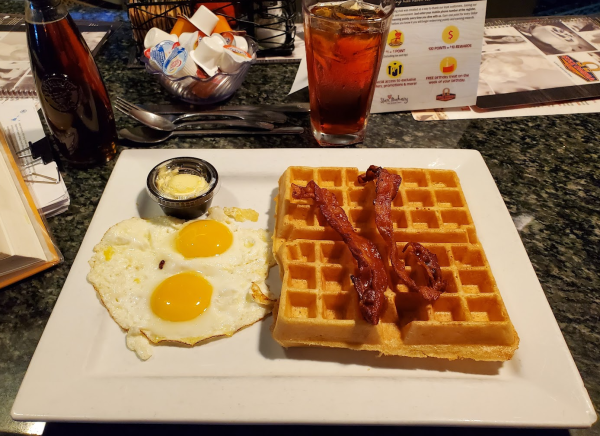
Normally I post at the end of the day, which means if I run out of time in the day, I don't post. Well, I want to change that, and unlike most of my other tasks, most of my blog posts don't expand into projects of unusual size. So I'm trying out starting by day with a tweet, a blog post, and a some work on my very longest-horizon projects, like my novel series or my nonfiction books, which cannot be completed in one sitting or even in a simple concentrated push over a few months, and must, therefore, be taken one step at a time.
And, so, hey! Here's a post. Enjoy.
-the Centaur
Pictured: I don't really do mornings, so this is the first "early" picture I could find, breakfast at Stax Omega.

No good picture for this one yet, but today I found out that the lightning strike that took out our internet may also have taken out the air conditioning for the upstairs (where, ya know, our bed and sleeping is). I seem to recall it having trouble before the lightning strike, but that may have been a completely different problem with the filters, which also need replacing.
Apparently this repair is going to be pricey, and it may be cheaper to replace the entire unit. This will take another week or so. In the meantime, we've run the fan so much the wallpaper has started to peel in the bedroom due to the humidity, and it's still to hot to sleep most nights. As Dr. McCoy would say, "Oh, joy."
My wife has wondered whether we should get lightning rods installed on the house. After several years here, this is our first strike, and I wonder whether it will happen again. There's the old saw that you prepare for the last disaster, and that seems to be true: we first had sewage problems, then a burst supply line on a toilet, then a separate problem with the AC, then tree removals due to ivy, then a freeze, now this. Not much of a pattern there except for the trees and ivy, which we're working on as a long-term project.
Hopefully next up we will not have tornadoes or flooding, because we really can't do that much about tornadoes, and since our house is high on a ridge, if we get flooded out, you can kiss Greenville goodbye.
More news as it develops.
-the Centaur
Pictured: the back porch at night, since I do not seem to have any good pictures of the recent torrential rains and the associated lightning strike, even though I distinctly recalled having taken some. :-/
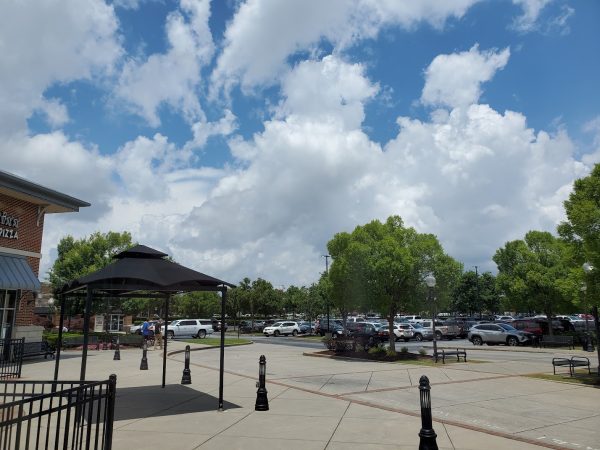
I wished I had a drone or something to fly up, or more hours in the day to drive around and find some place to take pictures not blocked by buildings and power lines. Even so, look at those beauties:

No filters, no AI, no nothing, just a Samsung phone (and Android's computational photography libraries).
-the Centaur

Sorry for the no posts for several days. I'd say it's because I've been busy prepping for the Embodied AI Workshop - and I was - but when I brought up the Library of Dresan interface, I saw a half-finished post on my cut hand, and realized, oh yeah, lightning struck the computer while I was working on this. And it did, or more properly, struck the broadband gateway and fried all the Ethernet-connected devices attached to it. Fortunately, the laptop was not one of those things, but it did put a crimp into things for a while. Back to it.
-the Centaur
Pictured: Well, I didn't capture a picture of the lightning, or the aftermath, as I was too busy dealing with the loud SNAP simultaneous with the lightning flash at 2am last week, but I did capture this picture of the torrential rains overwhelming our house's drainage system later that week.
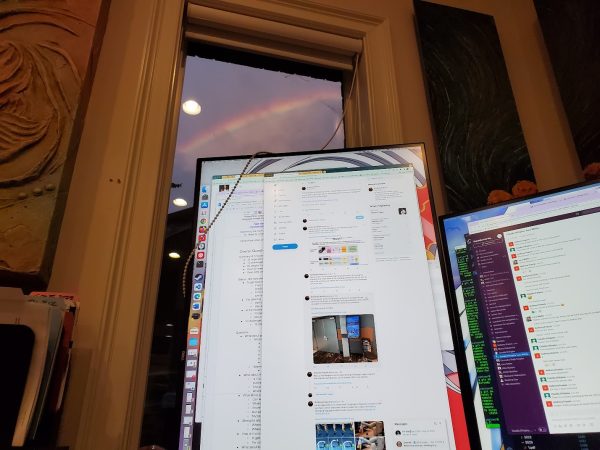
After almost a year's worth of work, at last, the Fourth Annual Embodied Artificial Intelligence Workshop is OVER! I will go collapse now. Actually, it was over last night, and I actually did collapse, briefly, on the stairs leading up to my bedroom after the workshop was finally done. But don't worry, I was all right. I was just so relieved that it was good to finally, briefly, collapse. A full report on this tomorrow. Off to bed.
-the Centaur
Pictured: A rainbow that appeared in the sky just as the workshop was ending. Thanks, God!

tl;dr: get to the point in the first line in your emails, and also in the subject.
"TL;DR" is an acronym meaning "Too Long; Didn't Read" which is used to introduce a quick summary of a longer document - as I did in the first line of this email.
Often when writing an email we are working out our own thoughts of what should be communicated or should happen - which means that the important point usually comes at the end.
But people don't often read to the end. So it's important, when you get to the end of your email, to port the most important point up to the top (which I typically do with the TL;DR tag).
And, even better, if you can put it in the subject line, do that too.
Your email is more likely to work that way.
-the Centaur
Pictured: our wedding dragon lamp, sitting on a side table with our wedding DVD, which is sort of a coincidence; and a very cool light bulb.
Discussed: a topic I swear I've written about in this blog, but I cannot find via searching past posts.

Just Loki, on the back patio, looking at a leaf ... with a little added magic (full size).
Producing this relatively simple image actually involved a fair number of Photoshop tools, several of which are new "generative AI" tools, but many others of which are just plain old machine vision magic:
- Layers (stacked images) used extensively to save original or alternate versions of things.
- Perspective Warp (a pretty impressive tool in its own right) to distort the image into a rectilinear shape.
- Content Aware Fill (a new Photoshop generative AI tool) to extend the warped stone tile to fill the frame.
- The Clone Stamp tool to complete the grout lines which were only partially filled in by Content Aware Fill.
- Quick Selection tool to isolate Loki and the leaf into their own layers for later.
- Selection > Modify > Expand and Selection > Modify > Feather to get the fine hairs on Loki's boundary.
- Generative Fill (another generative AI tool) to eliminate many of the leaves.
- More Clone Stamp to eliminate more leaves and minor imperfections.
- Layer duplication to create an original and to-be-colored tile backdrop.
- Swatches, the Rectangular Marquee tool, the Polygonal Lasso, and the Fill tool to create the colored tile.
- Color Burn layer blend mode (with 57% opacity) to create the primary Mondrian effect.
- Another layer duplication to create a new version of the colored tile to enhance the grout.
- Filter Gallery > Colored Pencil which fortuitously greyed out the colored tile and colorized the grout.
- Magic Wand tool set to Contiguous and 0% Tolerance to cut out the greyed tiles from the grout layer.
- Darker Color layer blend mode to enhance the grout.
- Drop Shadow on the leaf to make it stand out.
- Duplicating Loki into a layer with Darken to make him stand out against the colored grout.
- Adding Inner Glow modified to Darken as well (with a Choke of 14 and Size of 87) to eliminate some of the white halo around Loki.
- Adding a second Loki layer, Normal blend with 50% opacity, to get his sheen.
I like how it came out, especially given how it started:

I looked at that and thought, "You know, that's almost a Mondrian backdrop" and I was right!
-the Centaur

Sunlight, shining through the trees behind me, striking just some of the forest ahead. I took a few pictures (and even played with the contrast and vibrance of this one in Photoshop) but none of them quite captured the glow that the unseen sunset was leaving on these leaves.
-the Centaur

To the tune of 'Magic' by Olivia Netwon-John:
I don't believe in gravity
-the backyard snek
Nothing can stop me today
No matter how high I have to climb
Nothing can get in my way!
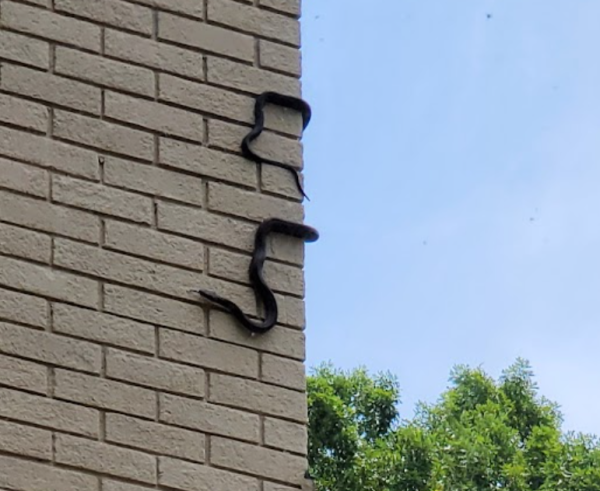
Seriously, this snake is a badass.
-the Centaur
Pictured: a snake that lives in our backyard, displaying a healthy contempt for gravity.

Still working on the social navigation paper. Here's a cat.
-the Centaur

Have been prioritizing the Social Navigation Principles & Guidelines paper (and helping my wife get ready for her business trip) so no detailed posts for you. Enjoy a sunset and a margarita.

-the Centaur
I saw some people blogging about their 20th blogging anniversaries, so I decided to check how long my blog has been up. And .. So! I apparently missed the blog's 20th birthday, as it started in November 2001 ...
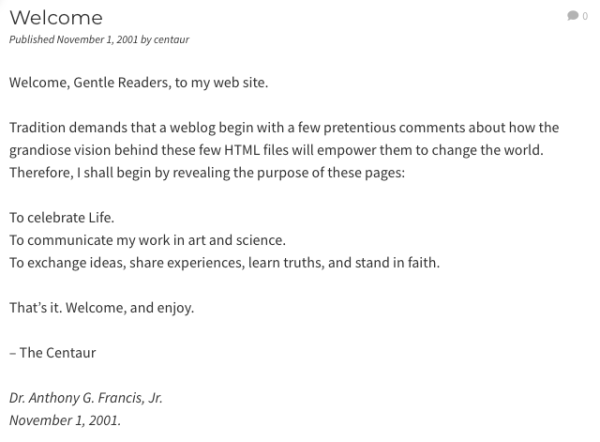
... unless I blogged it and forgot about it. And I also missed my first (recorded) web page's 25th birthday ...
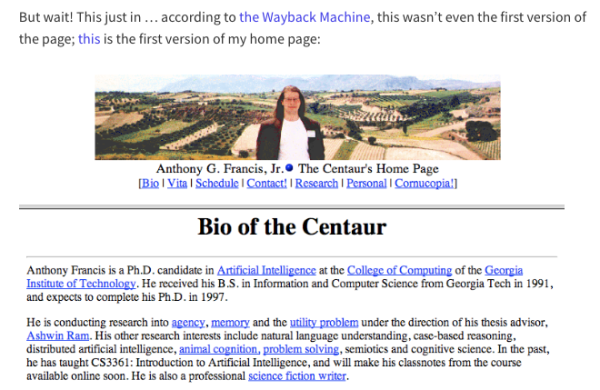
... as I started my website sometime in 1996.
So no birthday post for you. I guess I'll have to wait to the blog's 25th (or web page's 30th) birthday in 2026.
-the Centaur